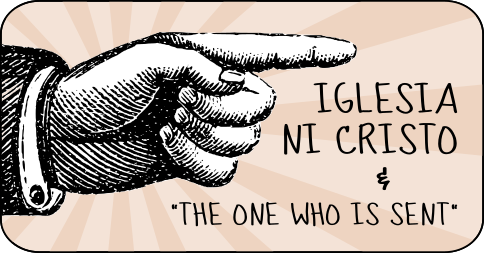Does John 13:16 teach that Jesus is not God?

The organization known as the "Iglesia Ni Cristo" often quotes John 13:16 in an attempt to demonstrate that Jesus is not God. Their argument is that since Jesus was sent by the Father, he must be a lesser being than the Father, and cannot be God. Similarly, they use this passage to say that because the Father and Jesus Christ both sent the Holy Spirit, the Spirit must be a lesser being than both the Father and Jesus. Is that what John 13:16 is teaching?
John 13:16 (ESV) - Truly, truly, I say to you, a servant is not greater than his master, nor is a messenger greater than the one who sent him.
Considering the context, it is clear that this verse does not teach that the sent is an inferior being to the sender, and therefore does not mean Jesus (or the Spirit) are not God.
This verse is talking about the service required of Jesus's followers.
In John 13:16, Jesus is speaking to his disciples. Immediately before that verse, Jesus says,
John 13:14-15 (ESV) - If I then, your Lord and Teacher, have washed your feet, you also ought to wash one another's feet. For I have given you an example, that you also should do just as I have done to you.
Jesus is showing his disciples that he, though he is Lord, is willing to humble himself by washing their feet. When he says "nor is a messenger greater than one the one who sent him", he is calling his disciples the sent ones, telling them they should not think themselves above being a servant, because their Lord was willing to be a servant.
Jesus acts this out in that he did not demand more priveledge than the one who sent him, but was a perfect servant.
The word "greater" refers to acting authority, not to being.
There are two ways to be "greater" than another - greater in authority, or greater in being. An example of the first would be a boss being greater in authority than his employee. An example of the second would be a human being greater than a dog. When the INC applies this verse to the Father and Jesus (or to the Father and the Spirit), they claim that the Father is greater in being than Jesus and the Spirit, but is this the kind of "greater" that Jesus is talking about?
The first half of the verse gives us an example of what Jesus means when he says "greater". A servant is lesser than his master, because he chooses not to do his own will, but does what his master commands. Another good example of this type of sending would be Saul and David.
1 Samuel 18:5a (ESV) - And David went out and was successful wherever Saul sent him.
Saul sent David on missions, because Saul was greater in authority, and David willingly submitted to that authority. However, Saul sending David does not mean that David was a lesser being than King Saul; they are both human. This shows that two persons can be equal, with one commanding authority, and the other willingly submitting.
The Father is greater than Jesus and the Holy Spirit in acting authority, not in being. This is the same sense of "greater" as the employee/boss example used earlier. The passage is speaking of this kind of "greater", and not about greater in being. The Father is greater, because Jesus and the Spirit obey his authority.
Conclusion
The INC twists the words of Christ, using this verse to claim Jesus is not God. This verse is not talking specifically about Jesus, and it is talking about the submission we should have as the ones who are sent. Jesus perfectly modeled this submission in that he humbled himself and fulfilled the roll of a servant perfectly. Jesus is telling his disciples to be willing to serve, because he--even with more authority than they--was willing to serve. In addition, just as a boss (who is human) can send an employee (who is human), the Father (who is God) can send the Son (who is God).
Anyone who claims to love the Bible should be very concerned when an organization is willing to misuse verses to prove their point. Jesus is indeed God, and he made no statements to contradict this truth.
